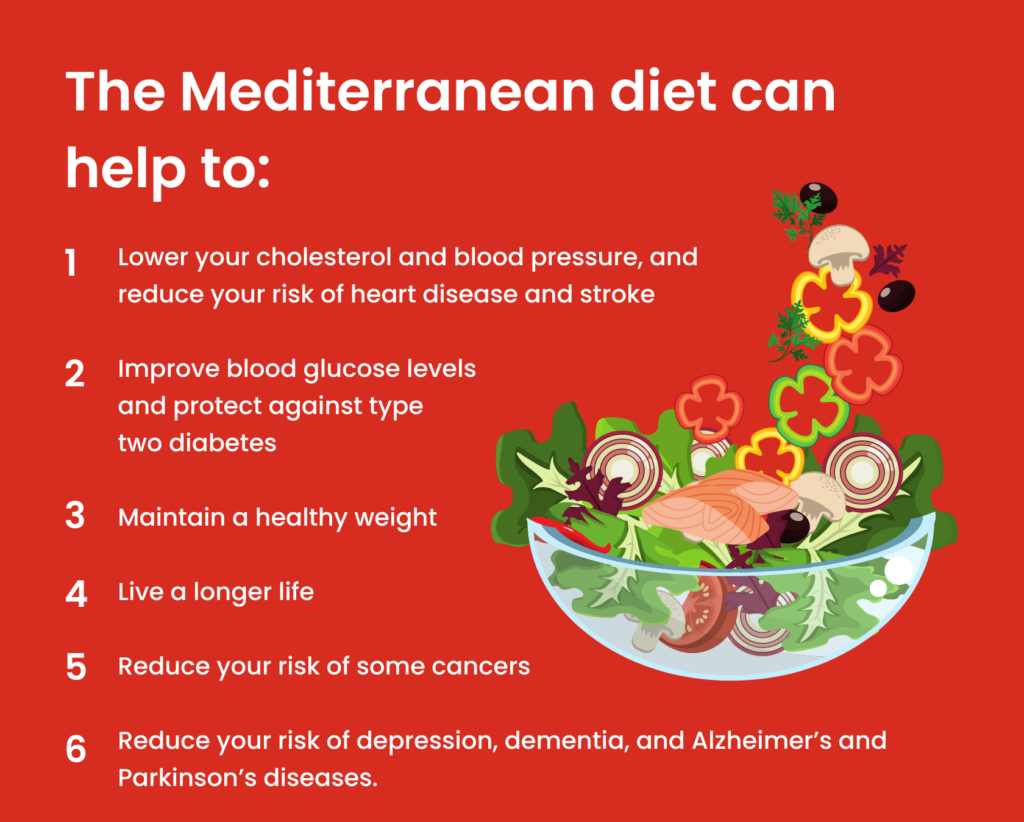Key points
- The Mediterranean diet is a healthy diet based on the cuisine of people living around the Mediterranean Sea.
- It is high in fruit, vegetables, wholegrains and pulses, and uses olive oil as the main fat.
- It is moderate in fish, eggs, poultry and low-fat dairy products.
- It is low in meat, butter and processed foods high in fat, sugar and salt.
What is the Mediterranean diet?
Studies show that people living in countries bordering the Mediterranean Sea, like Spain, Italy, Greece, Turkey, Morocco and other north African countries, enjoy lower rates of heart disease, stroke and type two diabetes than those of us living in Ireland and the rest of Europe.
Over the past 60 years, researchers have linked some of these health benefits to traditional food intake in these communities. While it differs from region to region, the Mediterranean diet typically has the following:
- lots of fruits, vegetables, wholegrains and pulses (such as beans, peas and lentils)
- moderate amounts of white and oily fish, eggs, poultry and low-fat dairy products
- low amounts of red and processed meats, butter, pastries and added-sugar foods
- mostly unprocessed plant-based foods flavoured with herbs and spices instead of salt
- olive oil rather than butter as the main fat source
- wine (optional) in small amounts, usually with meals.
The Irish Food Pyramid gives similar guidance to the Mediterranean diet.
Other Mediterranean lifestyle habits are also likely to play an important role in heart health, for example eating slowly and with others, leading a more relaxed way of life and enjoying regular physical activity.
What are the health benefits of the Mediterranean diet?
Year after year, the Mediterranean diet tops ‘healthiest diet’ ranks worldwide because of its health benefits and how easy it is to follow. The health benefits of the Mediterranean diet are not linked to a single food but an overall dietary pattern that is:
- rich in healthy unsaturated fats from olive oil, nuts and oily fish
- low in unhealthy saturated fat from butter, fatty meats and pastries and unhealthy trans fats from ultra-processed foods
- high in fibre, including soluble fibre, from wholegrains, fruit, vegetables and pulses
- high in vitamins, minerals, anti-oxidants and anti-inflammatory compounds from fruit, vegetables, wholegrains, olive oil, pulses and nuts
- naturally low in salt, as the emphasis is on fresh, minimally-processed foods.

Mediterranean diet and wine
Wine may feature in the Mediterranean diet, but it is optional and only taken in small amounts. The key message? If you don’t drink alcohol, don’t start, and if you do drink alcohol, take it in moderation.
Visit AskAboutAlcohol for more information.

